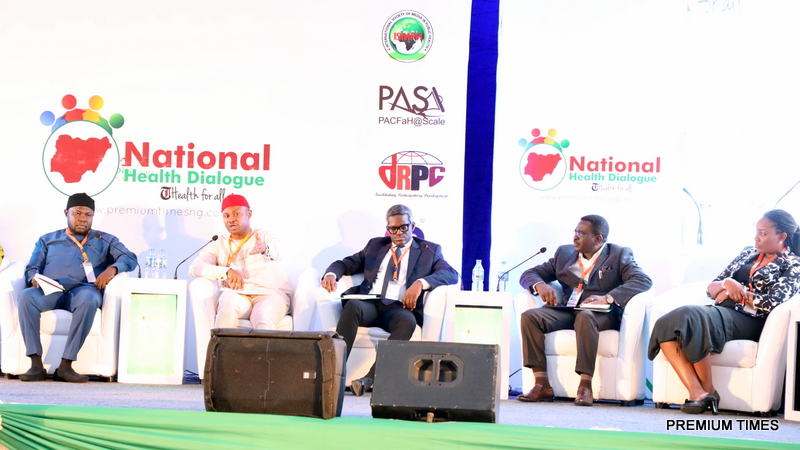He spoke Wednesday as a panellist on the “Challenges and Prospects of State Health Insurance Initiative” at the National Health Dialogue organised by PREMIUM TIMES and its partners.
The official and four of his colleagues, heading health insurance agencies in Osun; Delta; Bauchi and Kano sat on the panel.
They were asked to share their experiences and challenges in the implementation of the scheme in their individual states.
“As I speak to you, a popular philanthropist in Anambra has made payments covering 1,000 people in his community,” Mr Onyemeachi said.
He said the law guiding the scheme made health insurance mandatory in the state because 90 per cent of the citizens are in the informal sector.
“If 90 per cent of our population is in the informal sector, whatever we do and we do not target the woman who sells tomatoes on the street, the woman who fries akara (bean cakes) the wheelbarrow pusher then we have not achieved our aim,” he said.
‘Adoption model’
He said the use of the “adoption model” boosted coverage of citizens in the informal sector.
“Just in less than 10 months, over 70,000 people have already keyed into Anambra State health insurance scheme,” he said.
Also speaking, Ben Nkechika, SHIS Executive Secretary in Delta, said the state embarked on proper consultation of the informal sector before launching the scheme.
“We had a meeting with all the groups in the informal sector – Okada riders, artisans, petty traders, commercial vehicle drivers, etc. From the meeting, we did a baseline assessment report.
“The key thing that came out from this report is that we had to change the premium we were projecting before based on how much people told us they are willing to pay.”
Mr Nkechika said the state also embarked on partnerships with the private sector.
“Some abandoned PHCs were taken over by private organisations through the Public-Private Partnership PPP.”
Osun SHIS boss, Adeniyi Ngini, said the journey of health insurance in the state started with the establishment of the state health insurance agency.
He said the state worked with development partners that helped in developing the structure and benefits that helped in setting the scheme.
His counterpart in Kano, Mansur Mustapha, said his state adopted a socio-cultural programme that helped stabilise all the ‘misconceptions’ about health insurance.
Halima Mijin Yawa of Kano SHIS also explained how the state adopted a broad-based socio-cultural programme backed with data.
All the officials alluded to the need for nationwide awareness, especially in the informal sector.
Their comments, however, reaffirmed the peculiarities observed in the implementation of SHIS is various states
Peculiarities
One peculiarity in the setup of SHIS in different states is the premium to be paid by enrollees.
The Lagos government said it subsidized the premium for public servants in the formal sector.
For family premiums, civil servants will pay 25 per cent or N10,000 while the government pays 75 per cent or N30,000. This cuts across all grade levels of civil servants.
But in Niger State, enrollees would pay N600 per head monthly, which will amount to N7,200 annually for the informal sector. In the formal sector, 25 per cent of the monthly salary will be deducted at source.
State Health Insurance
Health insurance has been globally recognized as the fastest route for any country to achieve Universal Health Coverage.
Today, only five per cent of Nigerians are estimated to have health insurance, while Ghana’s scheme has covered over 50 per cent of its population.
The failure of the NHIS to deliver heralded the quest for the establishment of State Health Insurance Schemes (SHIS).
Experts believe SHIS offers each state a more feasible platform to manage their own homogenous cultures and context in taking health insurance to the last citizen.
Lagos, Niger, Delta, Anambra are among about 20 states that have begun implementation.
But as it is with NHIS – currently dogged with multiple challenges – if the establishment is not backed with a proper implementation plan, the SHIS will not succeed.
Source: Premiumtimes

 To boost coverage and participation, Anambra is engaging philanthropists in the implementation of the State’s Health Insurance Scheme (SHIS), Simeon Onyemachi, the Executive Secretary of the scheme has said.
To boost coverage and participation, Anambra is engaging philanthropists in the implementation of the State’s Health Insurance Scheme (SHIS), Simeon Onyemachi, the Executive Secretary of the scheme has said.




